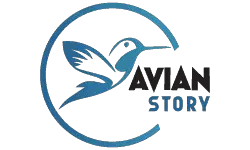Can Budgies Eat Watermelon? Find Out Now!
Budgies are famous little pets from the parrot family. They enjoy eating fresh fruits such as bananas, strawberries, grapes, pears, and melons. Now, you may be wondering, can budgies eat watermelon?
Yes, Budgies eat watermelon, which is entirely safe for their health. Watermelons are a fantastic way to keep your budgies hydrated. If your pet isn’t a big water drinker, try feeding them some watermelon slices.
Aside from hydration, you should be aware of your budgie’s nutritional requirements to determine how much watermelon is acceptable. Let’s find out right now!
Can Budgies Eat Watermelon?
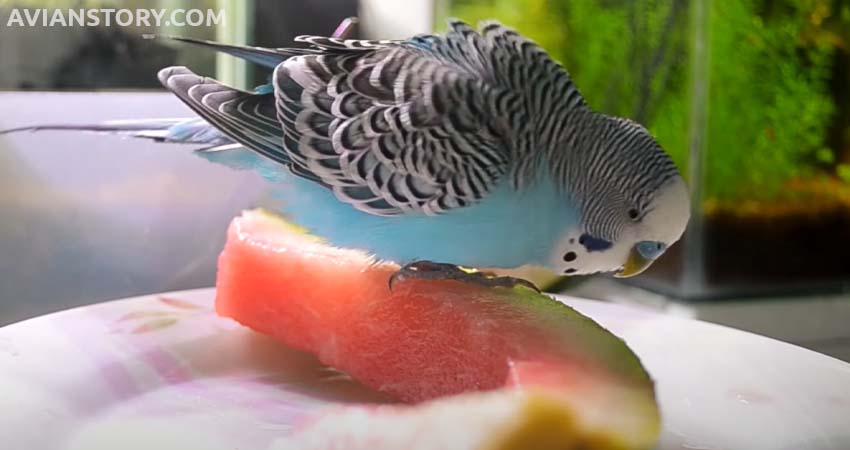
Yes, budgies can eat watermelon, and they prefer to eat it most frequently in the summer since watermelon is a tasty treat that keeps your budgie cool.
Budgies must stay hydrated during the day and have fresh water available to them frequently. Watermelons are likewise excellent choices due to their high water content that can keep budgies hydrated.
Watermelon has a high sugar content but is low in carbs and fiber. Potassium, copper, and vitamins A and B are also present, and all these nutrients are essential for your budgie’s health.
So, not only does your budgie enjoy watermelon, but it’s also good for them and won’t harm their health.
Watermelon’s Health Benefits for Your Budgies
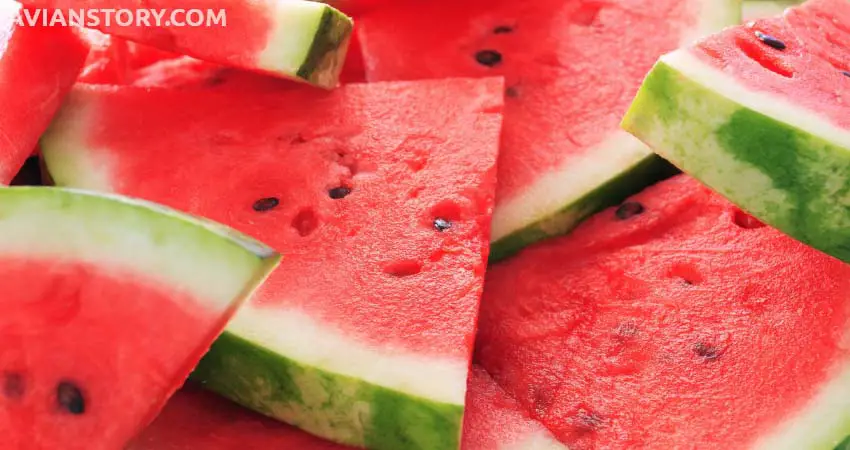
Watermelon is entirely harmless to your bird. It offers numerous health benefits too. Watermelon is loaded with various essential nutrients, including vitamins and minerals. Let’s have a look below;
- Vitamin A: Because it is rich in vitamin A, watermelon can help keep your pet bird’s beak and nails from growing too quickly. In addition to supporting their nails and lips from becoming cracked or broken.
- Vitamin B1: Vitamin B1 can significantly reduce seizures possibility in your bird. Enough B vitamins are present in watermelon to assist in maintaining their happiness and coordination.
- Vitamin C: It’s a necessary vitamin for budgies. Vitamin C is excellent for stress reduction, immune enhancement, and antibody formation! Which will keep your bird in good health.
- Potassium: Potassium boosts your bird’s metabolism while also strengthening its bones. It helps lower blood pressure and prevents water retention as well.
- Phosphorus: Phosphorus is essential for average bone growth and production in birds! They may have bone troubles if they do not eat enough phosphorus.
- Thiamine: Thiamine regulates your bird’s neurological system and helps it live a healthy life.
How to Feed Your Budgie Watermelon?
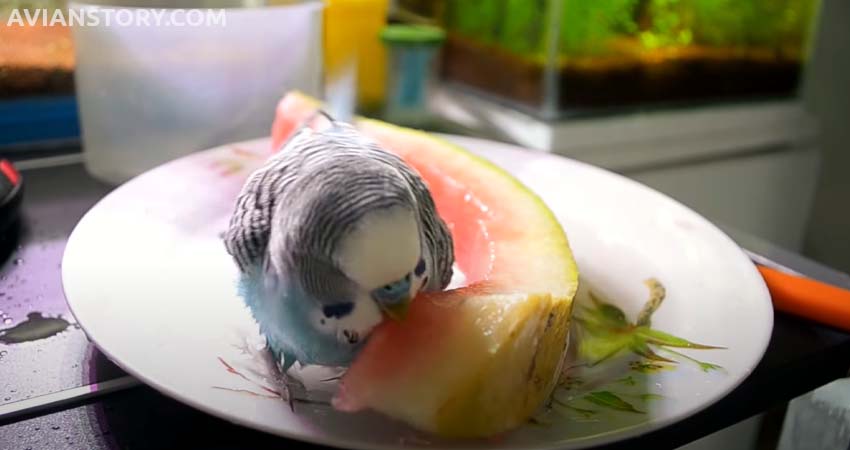
It’s crucial to remember that budgies are little creatures before you give them a treat like watermelon because of the risk of choking. They are unable to eat big quantities of food.
That means a small slice of watermelon will suffice to fill and satisfy their stomach. So, how to feed your budgie watermelon?
- Cut a medium-sized watermelon in half on one side
- Remove all the seeds from the watermelon
- Before feeding your budgie, chop the watermelon into little chunks
Budgies can create a mess when they eat, especially when they consume something juicy like watermelon. As a result, after your pet budgie has completed feeding, you must carefully clean its cage.
Let’s see how budgies eat watermelon;
How Many Watermelon Can a Budgie Eat?
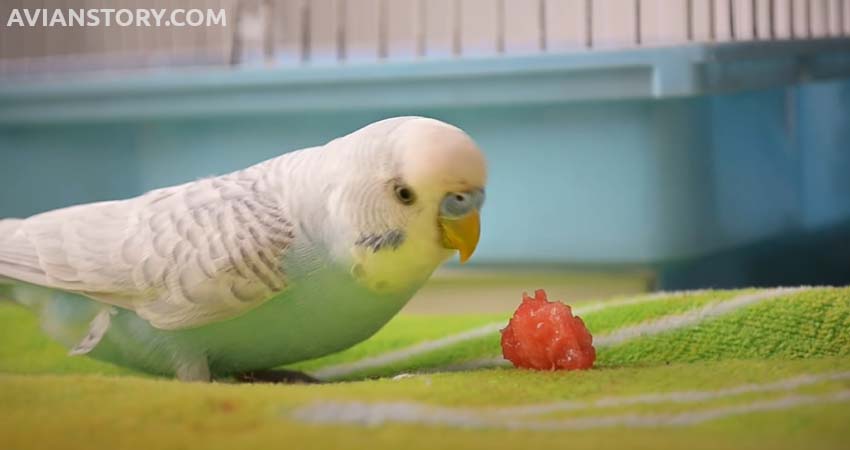
There is no doubt that watermelon may be a nutritious addition to your budgie’s diet. But, it can only be considered a weekly treat. Moreover, as a general rule, we know that you should cap your budgie’s treats at 10% of the daily calorie intake.
Keep the servings small, and don’t give your watermelon or anything else to eat until it has finished eating most or all of its main supper. Paying attention to their waste is one way to determine whether or not it is getting too much watermelon in their diet.
What Happens if Your Budgie Overeats Watermelon?
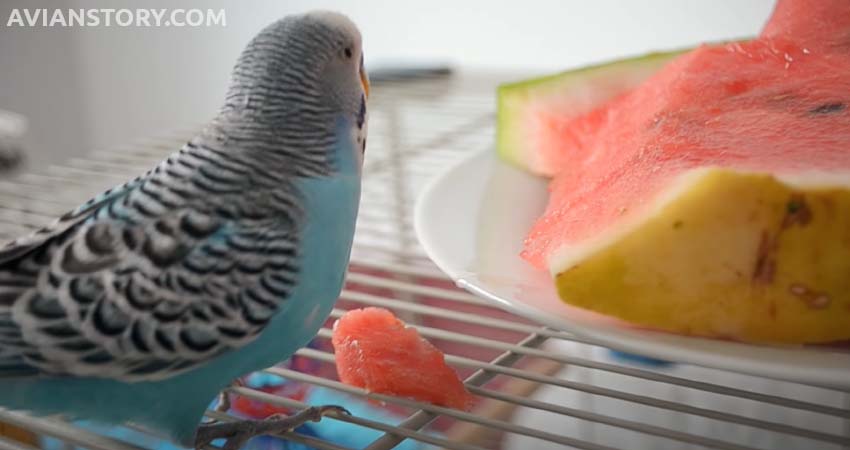
You must constantly be mindful of what you are giving your pet bird. And when watermelon is on the menu, moderation is necessary.
Consuming excessive amounts of watermelon might harm your budgie’s health due to its high sugar content. For instance, diabetes poses a severe risk to your budgies health.
- Increasing thirst and urine frequency are early signs of buccal diabetes. Their weight may fluctuate more as a result of this.
- Even tiny wounds can become infected very fast on your pet’s body.
- Your pet’s diabetes may also cause seizures.
Besides, watermelon contains a significant proportion of water, and feeding it to your bird may result in diarrhea. If you see your budgie’s stools looser than regular, stop giving him watermelon immediately. If the situation worsens, they may need to visit a veterinarian to receive the appropriate treatment.
Frequently Asked Questions
You may be interested in getting answered to some more questions regarding the topic. Let’s take a look at them!
Can budgies eat watermelon rind?
Yes, budgies can eat the rind of the watermelon. But you should be careful about giving your pet watermelon rind. Pesticides accumulate in the pores and coat them. So budgies can eat watermelon skin if they’re washed thoroughly to remove harmful pesticides.
Can budgies eat watermelon seeds?
Budgies can eat watermelon seeds, but you should know the seed size before offering them to your bird. A bird could suffocate on hard seeds. So you must consider softening them to ensure their safety. To do that, you can first soak the seeds in water, so they soften slightly and ensure that the seeds don’t get stuck in your parrot’s throat.
Can budgies eat watermelon juice?
Budgies love to eat watermelon; they can eat everything from the fleshy interior of the watermelon to the seeds. If you want to feed them watermelon juice, they can have that too. But the condition is that you can’t keep this juice outside for long enough, which can harm your pet’s health.
Final Thoughts
Watermelon is a delightful fruit that is also good for your budgie’s health. To prevent stomach issues, you must feed your bird this delicious fruit in moderation. It’s best to give your buggies a variety of foods since this will make eating more interesting for them and provide the best nourishment.
